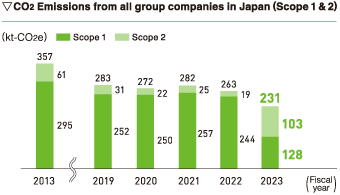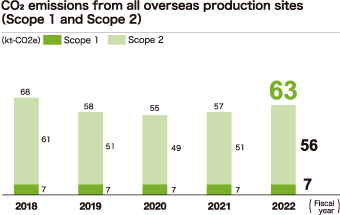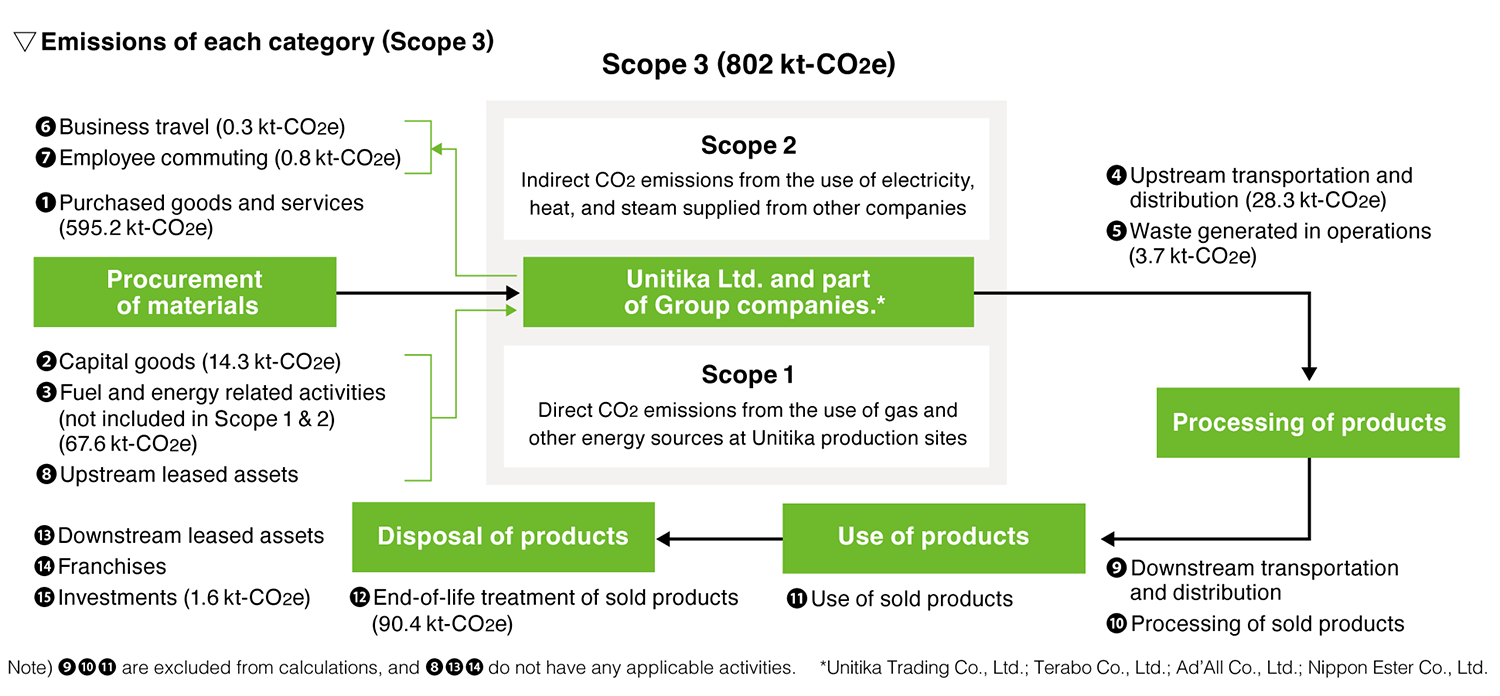CO2 Emissions Reductions
Basic Concept & CO2 Emissions Reductions Activities
The Unitika Group is aiming to realize a sustainable society through its business and corporate activities, and has long been working to address global climate change and environmental issues. From early on, Unitika has been focusing on reducing greenhouse gas emissions, such as by being a leader among other companies in installing a gas cogeneration system in our production sites (FY 2004 at the Uji Plant, and FY 2006 at the Okazaki Plant).
In the Unitika Group’s priority issues formulated in 2021, we set the reduction of greenhouse gas emissions as a priority issue, and have set the CO2 emissions reduction target for FY 2030 at 46% below the FY 2013 level, based on a conversion of greenhouse gases into CO2.
In our business activities, we believe it is important to first of all proactively do what we can ourselves, such as installing equipment that is effective in reducing CO2 emissions.
We believe that increasing the transparency of our activities will enhance our credibility as a company by systematically working to reduce CO2 emissions and announcing the results both internally and externally, as well as announcing our Scope 1, 2, and 3 emissions annually. We believe that pursuing optimal solutions for both corporate growth and the global environment will enhance corporate value and benefit all stakeholders.
Reduction of CO2 Emissions Related to Business Activities (Scope 1&2)
Every year, the Unitika Group calculates and reports on the following CO2 emissions at Unitika production sites and offices of our group in Japan : Scope 1, which are direct CO2 emissions from the use of gas and other energy sources; Scope 2, which are indirect CO2 emissions from the use of electricity, heat, and steam supplied from other companies.
In FY 2022 we expanded the types of greenhouse gases for calculation to include non-energy-derived greenhouse gases (so called “6.5 Gases”) in Scope 1. We also recalculated all data since FY 2013 to include non-energy-derived greenhouse gases, and we amended the actual standard value and target value of the KPI of CO2 emissions to values that include non-energy-derived greenhouse gases. We have kept in place the FY 2030 target of a 46% reduction in CO2 emissions (Scope 1 & 2) from all domestic production sites relative to the FY 2013 level.
The CO2 emissions of all group companies in Japan in FY 2023 was 231 kt-CO2e in total for Scope 1 and Scope 2. The reduction rate with FY 2013 as the standard year, which is the same as the current government target, is 36%. We are moving ahead with various measures, including updating energy-saving equipment, as we work toward achieving the 46% reduction target.
The CO2 emissions of all overseas group companies in FY 2023 was 70 kt-CO2e in total for Scope 1 and Scope 2. Compared to FY 2018 as the base year, it increased by 4%.


(Note) In FY 2023, due to the revision of the calculation method of energy emissions from cogeneration systems, Scope 1 decreased and Scope 2 of domestic business sites increased compared to the previous year.


KPIs of Priority Issues (Materiality)
CO2 emissions* (All domestic Group companies)
FY 2030 target: 193 kt-CO2e (46% reduction relative to the FY 2013 level)
FY 2023 actual results: 231 kt-CO2e (35% reduction relative to the FY 2013 level)
* Includes non-energy-derived greenhouse gases.
CO2 Emissions (Scope 3) from the Supply Chain (excluding Unitika)*1
In FY 2022, we started calculating the CO2 emissions of Scope 3. In FY 2023, the organizational scope of the calculation was expanded to include four Group companies*2 in addition to Unitika Ltd. and nine of the 15 categories were calculated, resulting in 802 kt-CO2e.
*1 This is the total of CO2 generated from the supply chain (from the procurement of
raw materials to the disposal of final products) related to Unitika’s businesses, excluding Scope 1 and Scope 2.
*2 Unitika Trading Co., Ltd.; Nippon Ester Co., Ltd.; Ad’All Co., Ltd.; Terabo Co., Ltd.

| Unit: kt-CO2e | |
|---|---|
| 2021 | 2022 |
| Total | |
| 613 | 586 |
| Category 1 - Purchased goods and services*1 | |
| 417 | 399 |
| Category 2 - Capital goods | |
| 11 | 13 |
| Category 3 - Fuel and energy related activities (not included in scope 1&2)*2 |
|
| 68 | 66 |
| Category 4 - Upstream transportation and distribution*1 | |
| 33 | 29 |
| Category 5 - Waste generated in operations | |
| 3.8 | 4.4 |
| Category 6 - Business travel | |
| 0.2 | 0.2 |
| Category 7 - Employee commuting | |
| 0.6 | 0.6 |
| Category 8 - Upstream leased assets | |
| No applicable activities | No applicable activities |
| Category 9 - Downstream transportation and distribution | |
| Not calculated due to difficulties in collecting data | Not calculated due to difficulties in collecting data |
| Category 10 - Processing of sold products | |
| Not for calculation*3 | Not for calculation*3 |
| Category 11 - Use of sold products | |
| Not for calculation*4 | Not for calculation*4 |
| Category 12 - End-of-life treatment of sold products | |
| 77 | 72 |
| Category 13 - Downstream leased assets | |
| No applicable activities | No applicable activities |
| Category 14 - Franchises | |
| No applicable activities | No applicable activities |
| Category 15 - Investments | |
| 1.8 | 1.8 |
| Unit: kt-CO2e | 2022 | 2023 | |
|---|---|---|---|
| Total | 586 | 802 | |
| Category 1*2 | Purchased goods and services | 399 | 595 |
| Category 2*3 | Capital goods | 13 | 14 |
| Category 3*4 | Fuel and energy related activities (not included in scope 1&2) | 66 | 68 |
| Category 4*2 | Upstream transportation and distribution | 30 | 28 |
| Category 5*3*5 | Waste generated in operations | 4 | 4 |
| Category 6*3 | Business travel | 0.2 | 0.3 |
| Category 7*3 | Employee commuting | 0.6 | 0.8 |
| Category 8*6 | Upstream leased assets | ー | ー |
| Category 9*7 | Downstream transportation and distribution | ー | ー |
| Category 10*8 | Processing of sold products | ー | ー |
| Category 11*9 | Use of sold products | ー | ー |
| Category 12*3 | End-of-life treatment of sold products | 72 | 90 |
| Category 13*6 | Downstream leased assets | ー | ー |
| Category 14*6 | Franchises | ー | ー |
| Category 15*3*10 | Investments | 2 | 2 |
*1 Unitika Trading Co., Ltd.; Terabo Co., Ltd.; Ad’All Co., Ltd.; Nippon Ester Co., Ltd.
*2 Some of the items have been accounted for within the scope of consolidation.
*3 Scope of calculation prior to FY 2022 is Unitika Ltd.
*4 The organizational scope is the Unitika Group.
*5 The organizational scope is the Unitika Group from FY 2023.
*6 No applicable activities.
*7 Not calculated due to difficulties in collecting data.
*8 Category 10 is not included in the calculations as the World Business Council for Sustainable Development (WBCSD) Guidance for Accounting and Reporting Corporate GHG Emissions in the Chemical Sector Value Chain stipulates that “chemical companies are not required to report on downstream emissions, since reliable figures are difficult to obtain due to the diverse application and customer structure.
*9 Not relevant. Because the products sold by Unitika are primarily materials, there are no products which use electricity or fuel, and there are no direct GHG emissions at the use phase.
*10 The data of FY 2023 is provisional value based on FY 2022 data.
Reduction of CO2 Emissions in Logistics
The Unitika Group undertake a variety of efforts to reduce the environmental impact associated with the delivery and emission of raw materials, products, waste, and other materials. These include promoting the shift of cargo transportation modes to more environmentally-friendly methods (modal shifts), and streamlining transportation to improve efficiency. As a specified consignor, the Unitika Group reported 48,752 kt-km of freight and 17.4 kt of CO2 emissions (34% reduction relative to the FY 2013 level) to the government in FY 2023. The Unitika Group will strive for eco-friendly logistics within the whole group by implementing a variety of practices. These include but are not limited to: expanding the use of trains, promoting idle stops, and the use of ecological tires.
TOPIC
Unitika Glass Beads Secures Top Energy Efficiency Rating for Sixth Year Running
The Ministry of Economy, Trade and Industry has awarded Unitika Glass Beads Co., Ltd., a general manufacturer of glass beads, the S (excellent energy saving) rating for the Sixth consecutive year for its actual results from FY 2018 to FY 2023, in the Business Operator Classification Evaluation System (SABC Evaluation System) of the Act on Rationalizing Energy Use (Energy Saving Act). All employees will continue working together on energy-saving efforts going forward, as a business operator (that achieves its targets) with excellent energy-saving initiatives.
https://www.enecho.meti.go.jp/category/saving_and_new/saving/enterprise/overview/institution/(The Business Operator Classification Evaluation results are published on the website of the Agency for Natural Resources and Energy.)

